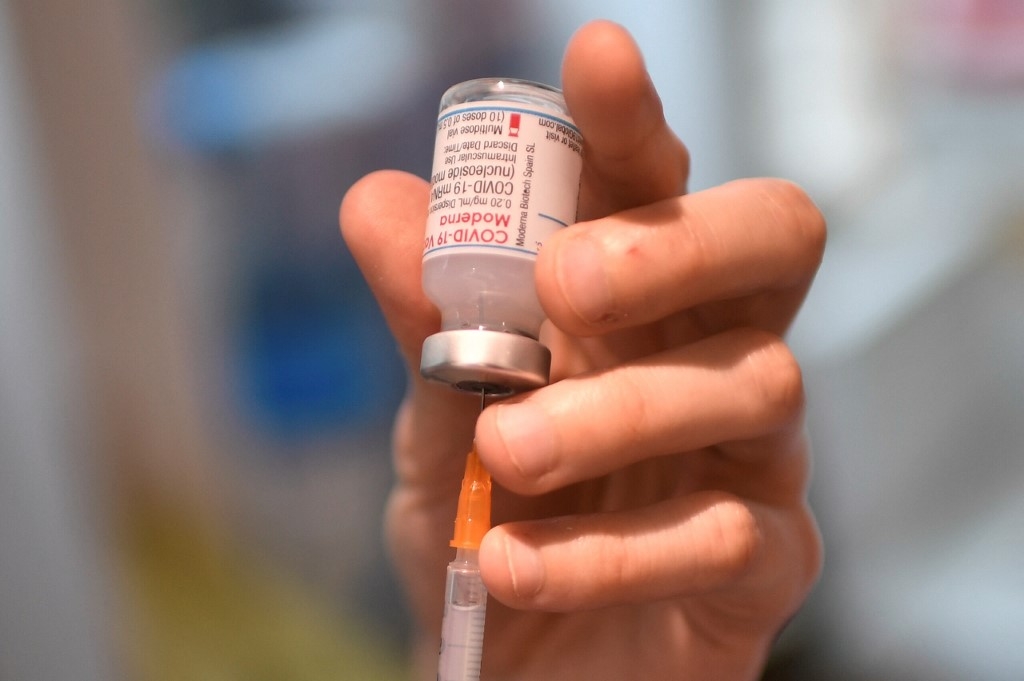Companies eager to take pandemic vaccine initiative
 |
| Covid-19 vaccine, STEPHANE DE SAKUTIN/AFP |
The European Chamber of Commerce in Vietnam (EuroCham) late last week also urged the government to go further and faster, harnessing the power of private enterprises and allowing companies to vaccinate their own staff.
According to EuroCham, four in five business leaders agreed that businesses should be able to inoculate their workforce. This would reduce the burden on the state budget while also helping accelerate the government’s vaccination drive.
“The private sector, including foreign enterprises can help speed-up Vietnam’s vaccination efforts,” said Eurocham chair Alain Cany. “Our companies can provide both the world-leading equipment and the international expertise essential to a successful mass vaccination programme. Therefore, Vietnam’s roadmap to recovery should harness the contribution of European businesses. But the planning needs to begin now so that we can hit the ground running as soon as vaccines are available.”
Likewise, the Korea Chamber of Business in Vietnam (KorCham) said a number of South Korean businesses are interested in providing test kits and equipment to cater for their own demand and for the country as a way to contribute towards local prevention against the pandemic.
KorCham vice chairman Hong Sun told VIR, “South Korean businesses are seeking a licence from the Vietnamese government, allowing them to import vaccines and RT-PCR test kits for their own use. South Korea is one of the world’s leaders in RT-PCR test kit manufacturing.”
He went on to elaborate that some South Korean companies have been asked to test all of their staff, however the testing cost is a concern.
While health experts agreed that businesses could cover the cost of COVID-19 vaccines for their staff, they cannot ensure their safety.
Dr. Nguyen Van Khoi from Quang Khoi General Hospital told VIR, “The vaccination process requires skilled health professionals from preservation to vaccination, especially for the new COVID-19 vaccine. Moreover, in case of side effects, only trained health professional can deal with them.”
Deputy Minister of Health Do Xuan Tuyen emphasised, “The country is fast-tracking vaccinations to increase the rate of inoculated people. However, the Ministry of Health (MoH) gives top priority to safety. Therefore, vaccinations should only be carried out under a strict and careful process.”
According to the MoH, Vietnam carries out careful consultation and screening examinations before any shot – a process that is not always carried out in other countries.
Despite it taking a longer time, leaders insist on the process in order to ensure the highest possible safety. To this end, careful and regular training courses are held for health professionals about the vaccination and anticipated serious side effects at cities, districts, and grassroots health facilities.
The prime minister last week approved the establishment of a COVID-19 vaccine fund to raise funds from various sources to ease the burden on the state budget, with the target of enabling the country to secure 150 million doses of vaccines to immunise 75 per cent of its population. Businesses have been urged make contributions towards the scheme.
To date, 110 million doses of COVID-19 vaccines are committed to be supplied to Vietnam in 2021. The MoH is negotiating with vaccine providers from countries like Germany, Russia, China, and others to increase the vaccine supply.
In regards to equipment for pandemic prevention, the MoH has opened wider doors for more import of biology products and medical equipment for coronavirus diagnostic tests, helping increase the country’s supply and thus enabling health departments, hospitals, also and research institutes to take the initiative in purchase for prevention and use.
In Document No.3740/BYT-TB-CT issued on May 6, the MoH revealed the list of biology products and medical equipment for in-vitro diagnostic tests for coronavirus that are to receive registration numbers and licences for imports, and a list of 26 domestic and international suppliers featuring prominent names such as Roche Diagnostics, Abbott, and Siemens Healthcare Diagnostics.
In the government’s effort and orientation to protect workers in industrial zones (IZs), and keep them in operation in the midst of the latest COVID-19 outbreak, the MoH last week began administering vaccinations for workers in IZs in the northern provinces of Bac Ninh and Bac Giang, currently the most seriously hit by the pandemic.
At Que Vo IZ in Bac Ninh, workers at Foxconn – which employs more than 10,000 people – have received a vaccine shot. Meanwhile, 300 workers at Fuhong Precision Component, which employs about 2,500 workers in Dinh Tram IZ in Bac Giang, were also inoculated.
What the stars mean:
★ Poor ★ ★ Promising ★★★ Good ★★★★ Very good ★★★★★ Exceptional
Themes: Healthcare Platform
- Hanoi intensifies airport monitoring amid Nipah disease risks
- Cosmetics rules set for overhaul under draft decree
- Policy obstacles being addressed in drug licensing and renewal
- Sanofi, Long Chau Pharmacy relaunch medicine blister pack collection initiative
- Takeda Vietnam awarded for ongoing support of Vietnam’s sustainability efforts
Related Contents
Latest News
More News
- Foreign leaders extend congratulations to Party General Secretary To Lam (January 25, 2026 | 10:01)
- 14th National Party Congress wraps up with success (January 25, 2026 | 09:49)
- Congratulations from VFF Central Committee's int’l partners to 14th National Party Congress (January 25, 2026 | 09:46)
- 14th Party Central Committee unanimously elects To Lam as General Secretary (January 23, 2026 | 16:22)
- Worldwide congratulations underscore confidence in Vietnam’s 14th Party Congress (January 23, 2026 | 09:02)
- Political parties, organisations, int’l friends send congratulations to 14th National Party Congress (January 22, 2026 | 09:33)
- Press release on second working day of 14th National Party Congress (January 22, 2026 | 09:19)
- 14th National Party Congress: Japanese media highlight Vietnam’s growth targets (January 21, 2026 | 09:46)
- 14th National Party Congress: Driving force for Vietnam to continue renewal, innovation, breakthroughs (January 21, 2026 | 09:42)
- Vietnam remains spiritual support for progressive forces: Colombian party leader (January 21, 2026 | 08:00)

 Tag:
Tag:

















 Mobile Version
Mobile Version